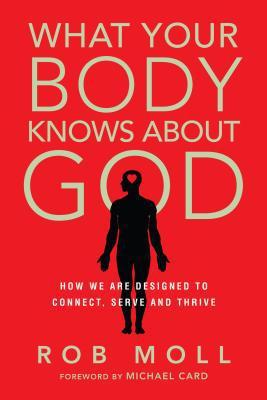
What Your Body Knows About God: How We Are Designed to Connect, Serve and Thrive. Rob Moll. Downers Grove, IL: InterVarsity Press, 2014.
Summary: Explores how our neurophysiology enables us to connect to God and others and how spiritual practices, liturgies, and opportunities to serve enable us to physically as well as spiritually thrive.
Believing people have long contended that to be human is to be made for God–to commune with God, to live in the world for God. Rob Moll, in this fascinating book, shows how the latest neuroscience and physiological research show how indeed our bodies seem disposed to spiritual seeking and living that spiritual life in the physical world.
For example: contemplative prayer practiced over eight weeks results in people who are more compassionate and observable changes occur in the brain. We are born connectors with an inborn capacity for relationship. Children who experience deeply love and mentoring in multi-generational Christian communities most often go on in adulthood to mature faith (my own story). Mirror neurons enable us to sense the mental states of others. The social nature of our brains suggests that our believing and belonging are connected. The powerful neurotransmitters secreted in our experiences of intimate love, whether mother and child, loves, or more darkly with various forms of pornography re-wire our brains for deep intimacy or auto-erotic isolation. It is often in our deepest weakness and physical suffering that we experience the most profound spiritual transformation.
Spiritual disciplines work by physical practice that shape our desires and emotions. The combination of social and multi-sensory experience (bodily movement, sound, smells, visuals, taste, and more) all combine to shape our knowledge of God. Serving others is indeed deeply satisfying and more so than self-indulgence. Moll summarizes his findings in this way:
Our physical bodies, down to the wiring in our brains and the genes in our cells and the chemicals filling the synapse between neurons, need this kind of faith. We have been designed for it. We are made to perceive and connect to God in a way that changes our very nature. And these changes are made most manifest in the tangible ways that we care for one another. As we connect with God and invite others to join this life of prayer, worship, community and service, we align our biological and spiritual selves with the Creator of the universe and the most fundamental guide for life–loving God and loving others (201).
It strikes me that there are two ways to respond to the knowledge Moll describes. One is the direction Moll goes which is to recognize the deep wisdom in the scriptures and centuries-long traditions of the church. The other could be scary, a form of psycho-social engineering of experience to manipulate spiritual experience. One treats people as free agents made for God and seeks their flourishing by inviting them into the wisdom of the Way which is also a wisdom of the body. The other manipulates people, using knowledge of neurophysiology to control responses and devotion. It is the method of cults and fanatical movements.
Moll doesn’t discuss the latter, but understanding the true has not only its own benefits, but also helps us recognize the counterfeits and the power of the spurious. Perhaps this is also knowledge the body needs.
Editor’s Note: Thank-you to Bob Trube for sharing his reviews with Emerging Scholars! Bob first posted the above review on Bob on Books. Related material on the blog includes a consideration of Malcolm Jeeves’s Minds, Brains, Souls and Gods: A Conversation on Faith, Psychology and Neuroscience (InterVarsity Press, 2013). ~ Thomas B. Grosh IV, Associate Director, Emerging Scholars Network
Bob Trube is Associate Director of Faculty Ministry and Director of the Emerging Scholars Network. He blogs on books regularly at bobonbooks.com. He resides in Columbus, Ohio, with Marilyn and enjoys reading, gardening, choral singing, and plein air painting.

Leave a Reply